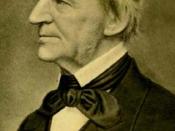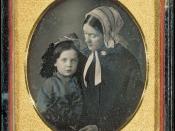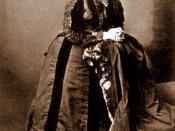"Jackson was not a noteworthy female poet, but simply a noteworthy poet." Ralph Waldo Emerson Jackson is one of the most interesting persons of her time. Born in 1831 she led a very interesting, yet equally sad life. Jackson's father, a stern congregational minister /author/ professor, died just three years after his wife Debrah. Debra's writing skills seemed to be passed down to her daughter even though Helen claimed, "I inherited nothing from either of my parents except my mother's gift for cheer." Undoubtedly her parents deaths in her tender youth caused some mental anguish.
However death was never far away from Jackson. Her two brothers both died at infancy. This left her alone in the world, besides her sister Anne and her Aunt. In 1852 Jackson married Edward Hunt, brother of the former New York State governor. While married she had her first kid Murray. Murray died of brain disease when he was less than a year old.
When Jackson was pregnant again, her husband suffocated in a underwater naval vessel of his own design.. Two years after her husband's death her second child died of diphtheria. Alone in the world, Jackson moved back to Newport, Rhode Island where she met back up with her childhood friend Emily Dickinson. Jackson then began seriously taking up her writing career in hopes of spurring social and political activism. Upset about the ways the Native Americans were being treated, Jackson began writing books about the Native Americans.
When she moved to California, to learn more about these Native Americans, she met William Jackson and remarried. A fractured leg left Jackson crippled, which only inspired her further, until in 1885, cancer claimed her life. This life of pain and suffering added deeply to Jackson's literature. Helen Jackson soaked up her experiences in life and channeled them through her work with the two themes of the suffering of the Native Americans and the death of a loved one. The poems this is present in are, "Danger", "Esther", "Unto one who lies at rest", and, "The Prince is Dead".
In Helen's life there was a point where she took a visit to Boston and, "attended a translated lecture by Chief Standing Bear about the federal governments forcible removal of the Ponca Indians from their Nebraska reservation to Indian Territory." This speech moved Jackson to become a relentless crusader for the tribes that were left. This experience led Jackson to write, "Danger." In this poem Jackson chooses to personify fear in the line, "Fear seeks for safety, reckons up the days of danger and escape, the hours and ways of death; it breathless flies the pestilence; if walls itself in towers of defense; by land, by sea, against the storm it lays down barriers; then, comforted, it says: 'This spot, this hour is safe,' Oh vain pretence." Her purpose in doing this was to show how the Native Americans sought safety in the governments' flimsy contracts in land negotiation. This personification is made vividly clear by Jackson because she had witnessed first hand the repeated lies that the government fed the Native Americans to strip them of their land. Jackson also touches on other experiences from her past like death.
Death is inherit to all men. Death is a part of living. However, the deaths that Jackson went through were extensive. She had to witness seven members of her family die. Jackson expresses her feelings in the poem, "Esther," in the line, "Thy portrait in that thrilling tale of old! Dead queen, we see thee still, thy beauty cold as beautiful; thy dauntless heart which knew no fear." Jackson goes on to characterize the, "queen," as , "maiden heart which was not sold though all the maiden flesh the king's red gold did buy!" Jackson is praising the deceased women when she writes, "A face more vivid than he dreamed who drew, Thy portrait in that thrilling tale of old!" Jackson also delves deeper into the matter of death in other poems.
"Unto one who lies at rest 'neath the sunset in the west clover-blossoms on her breast," is the first line of the poem "Unto one who lies at rest". In this poem we clearly see a correlation between the deceased and flowers. In lines like, "Moss-cups, tiarella leaves, dappled like the adder's skin fungus huts with ivory eaves which the fairies harbor in regiments of fronded ferns, golden-rod and asters frail every flaming leaf burns red against the autumn pale," Jackson uses imagery of flowers to paint a life-like scene. She uses the two senses; smell and sight, to give the reader a more in depth picture of the scene. Her experiences in life helped her to create the picture that we see when we read her poems. Jackson would do this in a number of her poems.
"The Prince is dead," is another example of how Jackson would draw from her life and recreate that feeling again through poetry. "But the heart of the queen will lack all things; and the eyes of the king will swim with tears which must not be shed," is another example of the imagery Jackson radiates. She goes on to write, "They have begged a few rags of black, they are hard at work though their eyes are wet, with tears which must not be shed," which further illuminates the previous line. Through the images created by Jackson, the reader gets a more in-depth picture of the death of a Prince. These images are created from Jackson's experiences in the death of family members.
Jackson lived a significant, yet painful life. She fought for just treatment of Native Americans. Jackson also lived through the deaths of seven of her family members. In "Danger", Jackson personifies fear. In "Esther", Jackson characterizes the queen. In "Unto one who lies at rest," and, "The Prince is dead" Jackson uses imagery. All these techniques are made unique by Jackson, because she had lived through these experiences. Jackson was descri bed by Ralph Waldo Emerson as, "not a noteworthy female poet, but simply a noteworthy poet." Gender isn't a factor in poetry. A poet can simply recreate her life experiences, and release them through poetry.





